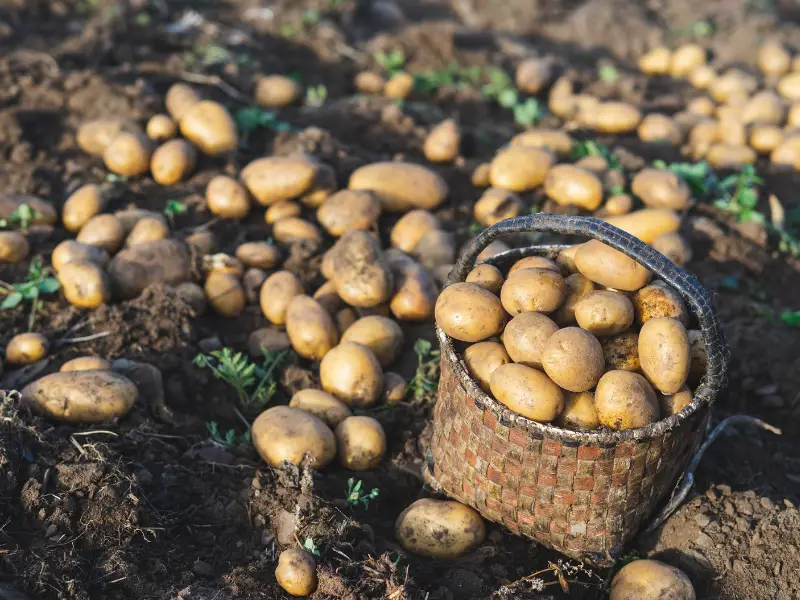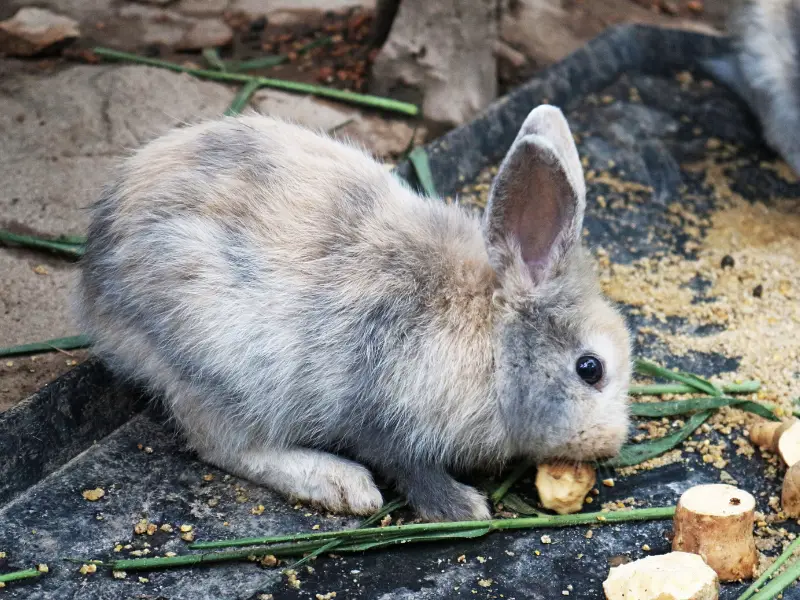Rabbits are known for their love of vegetables, but not all vegetables are safe for them to eat. One common question among rabbit owners is whether or not rabbits can eat potatoes. The answer is not a simple yes or no, as there are some important considerations to keep in mind.
Potatoes are starchy root vegetables that can be a healthy addition to a human’s diet, but they are not a natural part of a rabbit’s diet. While rabbits are herbivores and can eat a variety of fruits and vegetables, they have specific nutritional needs that must be met in order to maintain their health. It’s important to understand the potential risks and benefits of feeding potatoes to rabbits before deciding whether or not to include them in their diet.
So, can rabbits eat potatoes? In short, yes, but only in small amounts and with caution. In the following paragraphs, we will delve deeper into the nutritional value of potatoes for rabbits, the potential risks associated with feeding them to rabbits, and how to safely incorporate them into a rabbit’s diet.
Can rabbits eat raw potatoes?
Rabbits are herbivorous animals that require a diet rich in fiber and nutrients to maintain their health. They can eat a variety of vegetables and fruits, but not all of them are safe for them to consume. Potatoes are one of those vegetables that can be harmful to rabbits if not given in moderation.
Raw potatoes contain a toxin called solanine, which can cause digestive problems, diarrhea, and vomiting in rabbits. Solanine is a natural pesticide that is found in the leaves, stems, and unripe fruits of the potato plant. It is also present in small amounts in the potato skin and flesh.
Although cooking potatoes can reduce the levels of solanine, it is still not recommended to feed rabbits raw or cooked potatoes as a regular part of their diet. Potatoes are high in starch and carbohydrates, which can lead to obesity, dental problems, and digestive issues in rabbits if consumed in excess.
In summary, rabbits should not be fed raw potatoes due to the presence of solanine and high starch content. It is best to stick to feeding them a balanced diet of hay, fresh vegetables, and limited amounts of fruits.
Benefits of Feeding Potatoes to Rabbits

Potatoes are a starchy vegetable that can provide some benefits when fed to rabbits. Here are some of the potential benefits:
1. Source of Energy
Potatoes are a good source of carbohydrates, which can provide energy for rabbits. This can be especially beneficial for rabbits that are active or have high energy needs.
2. Vitamin C
Potatoes contain some vitamin C, which is an essential nutrient for rabbits. Vitamin C helps to support the immune system and can also aid in the absorption of other nutrients.
3. High in Fiber
Potatoes are relatively high in fiber, which can be beneficial for maintaining digestive health in rabbits. Fiber helps to promote healthy digestion and can prevent issues such as diarrhea and constipation.
4. Variety in Diet
Feeding potatoes to rabbits can provide some variety in their diet, which can help to prevent boredom and encourage them to eat a wider range of foods. However, it’s important to note that potatoes should only be fed to rabbits in moderation and as part of a balanced diet.
Overall, while potatoes can provide some benefits to rabbits, they should not be a staple food in their diet. It’s important to consult with a veterinarian or a rabbit nutritionist to ensure that your rabbit is receiving a balanced and appropriate diet.
Risks of Feeding Too Much Potato to Rabbits
Potatoes are starchy vegetables that contain high levels of carbohydrates and low levels of fiber. While rabbits can eat small amounts of potato as part of a varied diet, feeding too much potato to a rabbit can lead to health problems.
One of the main risks of feeding too much potato to a rabbit is digestive upset. Rabbits have sensitive digestive systems and are prone to developing gastrointestinal problems if their diet is not properly balanced. Too much potato can cause diarrhea, bloating, and gas, which can be uncomfortable and potentially dangerous for rabbits.
In addition to digestive problems, feeding too much potato to a rabbit can also lead to weight gain and obesity. Potatoes are high in calories and carbohydrates, which can contribute to excess weight gain if not balanced with other healthy foods. Obesity can lead to a range of health problems in rabbits, including heart disease, respiratory problems, and joint pain.
Another risk of feeding too much potato to a rabbit is the potential for toxic reactions. Potatoes contain solanine, a toxic compound that can cause serious health problems in rabbits if consumed in large quantities. While the solanine levels in potatoes are generally low, feeding too much potato to a rabbit can still cause toxicity and should be avoided.
Overall, while rabbits can eat small amounts of potato as part of a varied diet, feeding too much potato to a rabbit can lead to health problems. It is important to balance a rabbit’s diet with a variety of healthy foods to ensure they receive all the nutrients they need to stay healthy and happy.
How many potatoes can I give my rabbit?
When it comes to feeding rabbits potatoes, it is important to keep in mind that potatoes are high in starch, which can be difficult for rabbits to digest. As such, potatoes should only be given to rabbits in moderation.
A good rule of thumb is to limit the amount of potatoes given to rabbits to no more than one small slice per week. This is because potatoes are high in carbohydrates and can cause digestive issues in rabbits if given in excess.
It is also important to note that rabbits should never be given raw potatoes, as they contain solanine, a toxic substance that can be harmful to rabbits. Instead, potatoes should always be cooked before being given to rabbits.
In addition to limiting the amount of potatoes given to rabbits, it is also important to ensure that rabbits are getting a balanced diet that is high in fiber and low in carbohydrates. This can be achieved by feeding rabbits a variety of fresh vegetables, such as leafy greens, carrots, and bell peppers, as well as hay and a small amount of pellets.
Overall, while potatoes can be given to rabbits in moderation, it is important to keep in mind that they should not make up a significant portion of a rabbit’s diet. By following these guidelines, rabbit owners can ensure that their furry friends stay healthy and happy.
Can rabbits eat potato peels?
Potatoes are a common food item in many households. While they are safe for humans, it is important to know whether they are safe for rabbits. Rabbits are herbivores and require a diet that is high in fiber and low in starch.
Potato peels are not toxic to rabbits, but they are not recommended as a part of their regular diet. Potato peels contain a high amount of starch, which can be difficult for rabbits to digest. Eating too much starch can lead to digestive problems, such as bloating and diarrhea.
Furthermore, potato peels do not provide any significant nutritional value to rabbits. They are low in fiber and do not contain essential vitamins and minerals that rabbits require for a healthy diet.
It is important to note that rabbits have sensitive digestive systems and should be fed a diet that is specific to their needs. If you are unsure about what foods are safe for your rabbit, it is best to consult with a veterinarian or a rabbit nutritionist.
In summary, while potato peels are not toxic to rabbits, they should not be a part of their regular diet due to their high starch content and lack of nutritional value. Rabbits should be fed a diet that is high in fiber and specific to their nutritional needs.
Related Articles:

